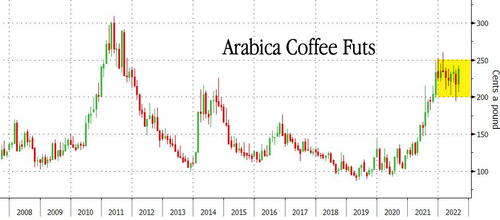Could Poor Coffee Harvests Send Prices Even Higher?
Coffee prices have been in a tight trading pattern for much of this year and at the highest levels since the commodity boom a decade ago. Poor harvest outlooks and tighter global supplies could send prices even higher.
Let’s first examine the world’s largest coffee exporter, Brazil — its top producing areas of Parana, Sao Paulo, and Minas Gerais are expected to produce poor harvests because of drought and frost. This means global supplies will tighten further, resulting in what could be even more coffee inflation for US consumers.
“Very dry weather over Brazil’s major arabica-growing regions during the second half of August added to drier-than-normal conditions the region has seen” due to the La Nina weather phenomenon, the Hightower Report said. – Bloomberg
Meanwhile, adverse weather conditions have hurt coffee production in neighboring Colombia, another major producer. Producers in Honduras, Guatemala, Nicaragua, and Costa Rica also show crop stress signs.
Across the world, in Vietnam, the second-largest coffee producer and top supplier of robusta, stockpiles will be halved by the end of September versus a year ago, according to the median estimate in a Bloomberg survey of traders.
Dwindling reserves and poor global harvest outlooks come as demand increases. The International Coffee Organization stated global demand would outpace supply for the second consecutive year. At the same time, Fitch Solutions said bean stocks in Intercontinental Exchange warehouses are at their lowest point this century.
We noted last year that Caribou Coffee Co. stockpiled extra beans in late 2021.
Rabobank’s Carlos Mera warned in February that coffee prices might ‘soar out of control‘ due to dwindling stockpiles.
So far, Arabica coffee futures have been range bound since the beginning of the year after a 180% run-up from the early days of the pandemic.
The tight trading range between $2-2.50 per pound suggests a big move is coming — and if poor harvests continue in top producing countries with outsized global demand, this may imply prices could head higher.
Tyler Durden
Wed, 08/24/2022 – 17:20

